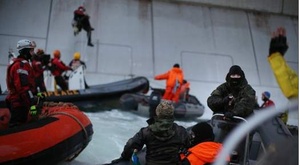
The system built to manage Russia’s nuclear legacy is crumbling, our new report shows
Our op-ed originally appeared in The Moscow Times. For more than three decades, Russia has been burdened with the remains of the Soviet ...
News

Publish date: September 20, 2013
Written by: Anna Kireeva
Translated by: Charles Digges
News
It was a busy week for the Russian Arctic: Russian and Norwegian scientists gathering in Murmansk, oil and gas company representatives joined the flock to hammer out cooperative deals on preserving the environment and how to handle eventual oil spills.
The Conference of Parliamentarians of the Arctic Region (CPAR) agreed to global cooperation while activist from Greenpeace waged a siege on Russia’s single ice class stationary oil platform, the Prirazlomnaya, owned by Russian state gas monopoly Gazprom in an attempt to stop Russia’s risky and economically dubious endeavors to drill oil on the Arctic continental shelf.
Shots were reportedly fired across the bow of Greenpeace’s Arctic Sunrise ship. As of Friday, 30 activists where being held at gunpoint by Russian coast guard officers who stormed the Greenpeace ship, the BBC reported. Later reports on Friday indicated the activists were en route with Russian authorities to Murmansk. They are expected to arrive on Monday.
According to Anton Vasiliyev, Russian Ministry of Foreign Affairs special envoy, the Arctic has in the recent past changed significantly.
“The military stand-off of the past decades has dissipated and the Arctic region has become a territory of international cooperation where there are no unanswered questions,” he told the CPAR meeting that took place in Murmansk on Thursday.
He also noted that Russia has become the first Arctic nation, having in 2008 adopted its own Arctic strategy. Its fundamental priorities are recovering natural resources, developing the Northern Sea Route, and defending the Arctic ecosystem and preserving the way of life of northern peoples.
Vasiliyev underscored that one of the most important tasks is observing a balance between the business interests flocking to the Arctic and preserving its fragile ecosystem.
“The Arctic is the worlds last store room of untapped hydrocarbons, the lions share of which belong to Russia,” he said. “Of course, Russian business is gravitating to the Arctic, but there is still a bit of time before it gets there. Our gas and oil companies understand what kind of environmental responsibility they have.
Vasiliyev added that the environmental aspects of exploiting Arctic resources demand large financial expenditures, which are necessary for defending the delicate environmental circumstances in the region.
Russia has not yet begun any development at any of its Arctic field. The Shtokman gas field project has been frozen, and other projects are ensnared in negotiations. The environmentally dubious Prirazlomnoye project is the single Arctic field that Gazprom has been trying to launch for over a year.
Despite this, special envoy Vasiliyev is convinced that “the period of abstract conversations will pass, and a time of concrete action will come – for Russia, the Arctic is our home and our future. We see it prospering.”
Maxim Shingarkin, the deputy chairman of the Duma for natural resources, land use and ecology (of the nationalist Liberal Democratic party) said that many companies who have earlier worked in Eastern Siberia are adopting new environmental standards.
Additionally, a set of amendments to Russian legislation “On the Continental Shelf” and “On internal Territorial Waters” have been introduced in the Duma. A bill on best possible technologies has also been completed.
“The main goal of the amendments is to defend the sea from oil and petroleum product contamination,” said Shingarkin. “We can confidently say that today Russia has the strictest legislation in terms of environmental regulation of the Arctic.”
The robustness of a law, however does not insure compliance. There are known circumstance, including a number in the Murmansk region, when emergency rescue divisions have not been able to reach oil spills in timeframes specified by law because the accidents happened in remote and poorly equipped regions. Another problematic issue is dealing with petroleum containing waste. The Murmansk region has no system for treating such waste, and specifically lacking are storage facilities for oil-contaminated waste.
Additionally, Russia’s customs laws create issue in the Murmansk Region that can negatively impact international assistance when it comes to cleaning up oil spills.
For many years, Russia has participated in international training seminars on liquidating oil spills and it is assumed these rescue units can quickly come to the aid of their neighbors in the event of leaks and slicks.
“The last training exercise, in June of 2013 in Kirkenes Norway evidenced the professionalism of rescue workers,” noted Alexander Glazov, director of EkoCenter, a rescue umbrella group. “But after the exercise, out equipment got held up at a temporary border holding storage facility for several days. If we are to help each other, we need to deal with these issue.”
Despite the calls of politicians and diplomats to cooperation in the Arctic, environmentalists don’t believe the assurances of oil companies that the Arctic shelf can safely be developed. Bellona, along with other of the most prominent ecological groups in Russia again warn that oil and gas companies are not prepared to work in the hard conditions of the Arctic shelf, and the vulnerable ecosystem there demands that state policy directed toward these aims be reviewed with an aim to realizing safer and more economically profitable projects.

Our op-ed originally appeared in The Moscow Times. For more than three decades, Russia has been burdened with the remains of the Soviet ...

The United Nation’s COP30 global climate negotiations in Belém, Brazil ended this weekend with a watered-down resolution that failed to halt deforest...

For more than a week now — beginning September 23 — the Zaporizhzhia Nuclear Power Plant (ZNPP) has remained disconnected from Ukraine’s national pow...

Bellona has taken part in preparing the The World Nuclear Industry Status Report 2025 and will participate in the report’s global launch in Rome on September 22nd.